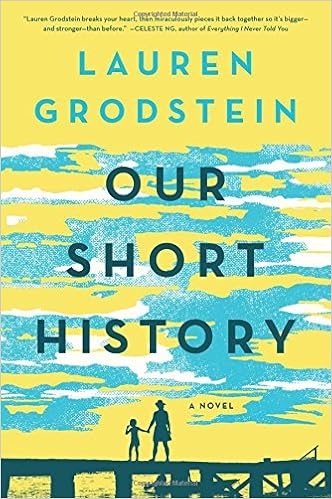Lauren Grodstein, Our Short History
Now Karen has terminal cancer and is given maybe just a couple of years to live. She is the single mother of Jake, a six-year-old boy, and this novel takes the form of her statement of love, advice and family history to be read by Jake when he turns 18.
The complication for Karen, as if her life hadn't become complicated enough, is that Jake wants to meet his father. Dave, the love of Karen's life, had disappeared after she had become pregnant. Now he is a New York lawyer and married. When she contacts him, she is shocked by how much Jake likes him and by how much Dave's attitude toward children has changed. Now he wants to become involved in Jake's life, and this frightens Karen, who had already made plans for Jake to be cared for by her sister in the state of Washington. Will Dave, a lawyer after all, try to gain custody of his son? Can she, a dying woman, do anything to prevent that? And, considering the growing relationship between father and son, should she even try?
Karen's many imperfections add depth to Grodstein's novel that wouldn't exist if the protagonist were a goody-goody woman. Even Jake is not a perfect little boy. He is clearly spoiled, demanding and given to tantrums to get his way. As for Dave, he buys Jake too many presents and allows him to watch the wrong king of movie, yet he still comes across as too good to be true -- handsome, wealthy, well-meaning and totally reformed in his attitudes toward family. His near-perfection makes Karen's dilemma all the more difficult. She let this guy get away, now she can't keep him away.
A key passage in the novel comes when Karen goes to meet her candidate's political foe, a woman who has herself struggled with cancer. She discovers that the person she is trying to destroy is a wonderful woman, much more decent than her own candidate or, for that matter, Karen herself. This meeting, more than anything, changes Karen and guides her in the choices she must make.

No comments:
Post a Comment